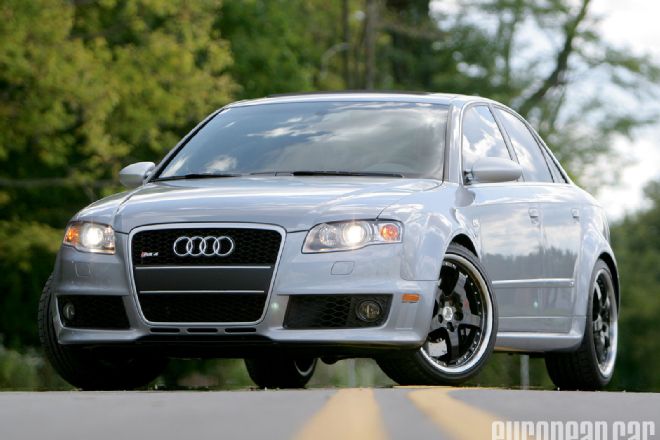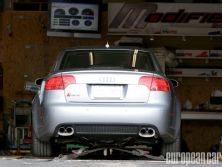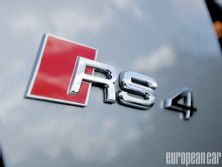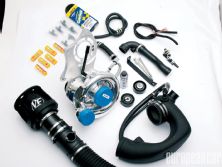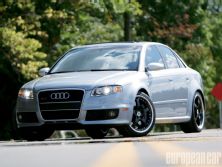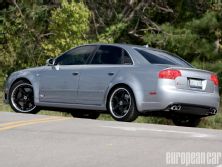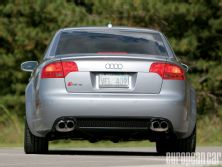When it comes to understated cars, the B7 Audi RS4 is the flagship. Its wide stance doesn't scream for attention, but if you're lucky enough to get a second glance you'll find yourself staring, studying every high performance detail, from the massive brakes inside 19-inch wheels, to the flared fenders. It's lovely, but with a rated 420 hp it packs a meaner bite than its looks.
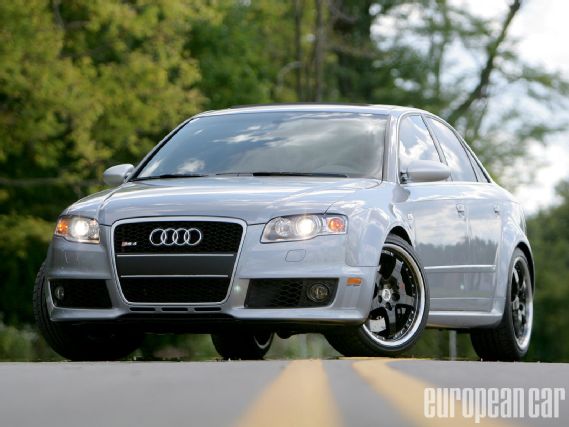 |
2008 Audi RS4 B7 - Proven
|
2008 Audi RS4 B7 - Proven
Going against logic, and fueled only by our passion for performance, we took this silver 2008 example to see how it could be improved with basic upgrades. To start, we took our PerformanceBox from VBox USA, and established braking and handling baselines.
First up was a set of lightweight wheels from Forgestar, wrapped with Continental SportContact 3 tires. This combination was ordered in factory 9x19 and 255/35-19 sizes for the wheels and tires, respectively. At two pounds lighter per corner, performance slightly improves in every department, but when compared to the previous Michelin Pilot Sport all-seasons on the factory Audi wheels, the softer Conti tires helped our 100-to-zero mph braking improve from an already impressive 383 feet to a breath-snatching 355 feet. This also showed in peak braking g-forces, with a 1.01g to 1.11g improvement.
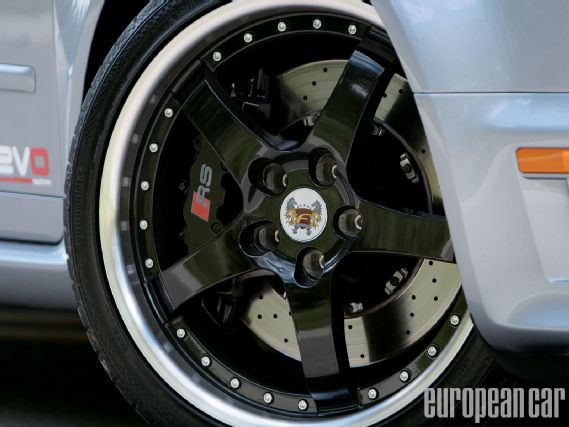 |
Even though factory RS4 wheels are light, Forgestar forged wheels saved us an additional two pounds per corner-and they look magnificent.
|
Even though factory RS4 wheels are light, Forgestar forged wheels saved us an additional two pounds per corner-and they look magnificent.
The RS4's road holding prowess around our third-gear test turn also benefited from the new Conti shoes. A jump from an average peak 1.12g lateral acceleration to 1.16 confirms this.
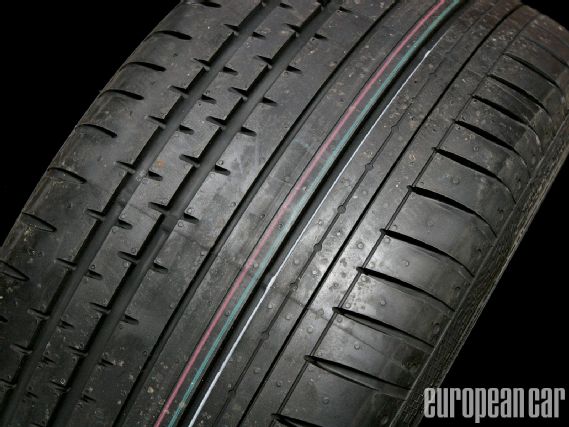 |
When compared to the car's all-season Michelon Pilots, these high performance Continental SportContact3 summer tires shortened the car's braking distance by 28 feet and 0.10 deceleration g in our 100-to-zero mph test, and 0.04 g lateral acceleration in our cornering test.
|
When compared to the car's all-season Michelon Pilots, these high performance Continental SportContact3 summer tires shortened the car's braking distance by 28 feet and 0.10 deceleration g in our 100-to-zero mph test, and 0.04 g lateral acceleration in our cornering test.
Vehicle Data
Engine: 4.2-liter V8 FSI, 32-valve
Transmission: Six-speed manual
Mileage: 8,000
Current modifications: Forgestar wheels,
Continental Conti Sport 3 tires
Dyno data: Dynojet 424x
Temperature: 73-82°F
Humidity: 16-25%
Test gear: Third
Baseline
Peak power: 321 hp @ 7400 rpm
Peak torque: 268 lb-ft @ 3400 rpm
Temperature: 73° F
Humidity: 22%
3000-8000 rpm dyno
acceleration: 8.38 sec
Test Notes
The most notable part of the car is its direct-injection 4.2-liter V8 revving to a claimed 8250 rpm. But we're still determined to improve this.
To ensure no power spikes or dips from poor fuel or spark we filled up with good 92 octane fuel and drove to Modified by KC, our dyno and installation facility in the Midwest. There, we also swapped in a new set of O.E. NGK "R" sparkplugs ordered from Sparkplugs.com (part no. PFR7W-TG), which saved us around 25 percent off the dealer cost.
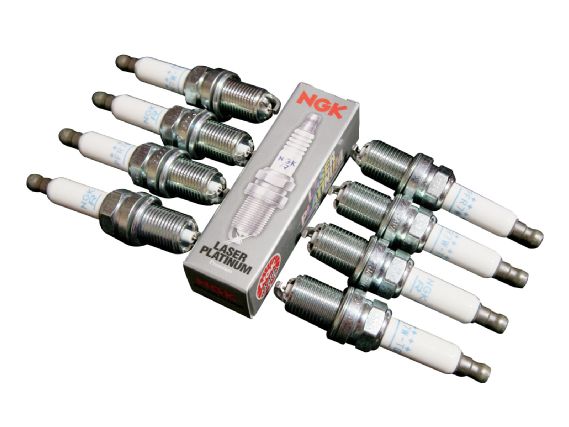 |
New NGK-R Laser Platinum spark plugs from Sparkplugs.com (p/n PFR7W-TG) ensured accurate testing by eliminating power dips, and we saved 25 percent over dealer cost.
|
New NGK-R Laser Platinum spark plugs from Sparkplugs.com (p/n PFR7W-TG) ensured accurate testing by eliminating power dips, and we saved 25 percent over dealer cost.
After several dyno pulls on MKC's Dynojet 424x dynamometer and using their OBD-II scan tool to monitor for proper intake and coolant temps, and taking note of total ignition advance, we established a baseline of 321 hp to all four wheels. Flat torque lovers will appreciate 268 lb-ft sustained from 3400 to nearly 6500 rpm.
Since there appeared to be no power differences between third and fourth gears, testing was done in third to limit the strain on the engine. The RS4 is equipped with a Sport button, which opens up a second chamber in the muffler system that's audibly evident. But we dynoed both ways, and while the throttle response improvement was evident, ignition values didn't change and, thus, neither did power output.
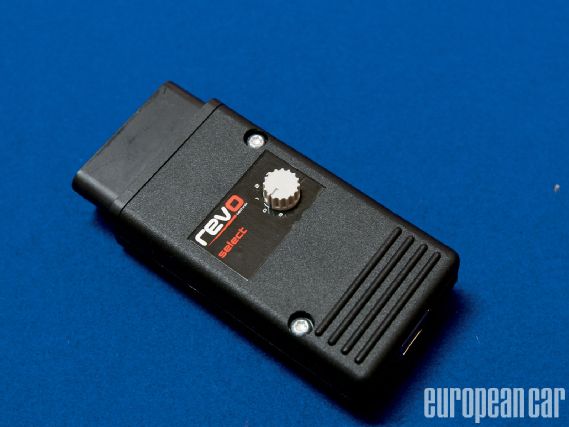 |
2008 Audi RS4 B7 - Proven
|
2008 Audi RS4 B7 - Proven
Last, although the car is advertised to have an 8250-rpm rev limit from the factory, the dyno showed fuel cuts out just under 8100 rpm.
Test 1
Performance
Peak power: 328 hp @ 7200 rpm
Peak torque: 274 1b-ft @ 3400 rpm
Max power gain: 13.5 hp @ 6100 rpm
Max torque gain: 13.0 lb-ft @ 5200 rpm
3000-8000 rpm acceleration: 8.16 sec.
Temperature: 76° F
Humidity: 19%
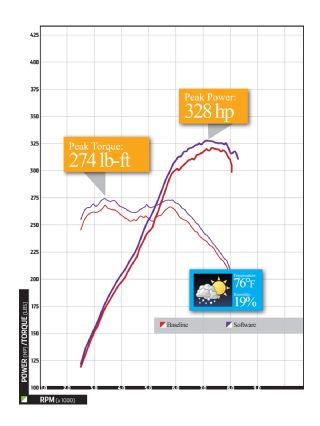 |
Revo Technik Stage 1 software upgrade
|
Revo Technik Stage 1 software upgradeGraph 1: Baseline vs. Software
Parts: Revo Technik Stage 1 software upgrade Options: 91-, 93- and 100-octane tunes available, Revo multiple program switching control module Installation time: 15 minutes MSRP: $699
Pros
• Completely reversible, "zero" physical modifications
• Rev limiter increased to 8300 rpm
• Top-speed governor removed
• Improved throttle response
• More power
• Custom tunes available with Revo distributors
• Handheld flashloader provides more options, including valet mode
Cons
• None
Test Notes
Unlike other software tweakers that offer a base map only, Revo can further adjust fuel mixtures and ignition values to get the best out of your vehicle's current modifications through any of its nation-wide dealers. In fact, Revo encourages visiting a dealer, even after you've installed its software using the handheld module, to make sure your car is running optimally. Furthermore, throttle response can be fine-tuned to the owner's liking.
While this is good, we did even better by enlisted Revo's own George Osmun to fly out to Kansas City and give this Audi the personal treatment. After loading up a program he was happy with, the car netted a peak 13.5 hp and 11.6 lb-ft of torque in the middle of the rev range.
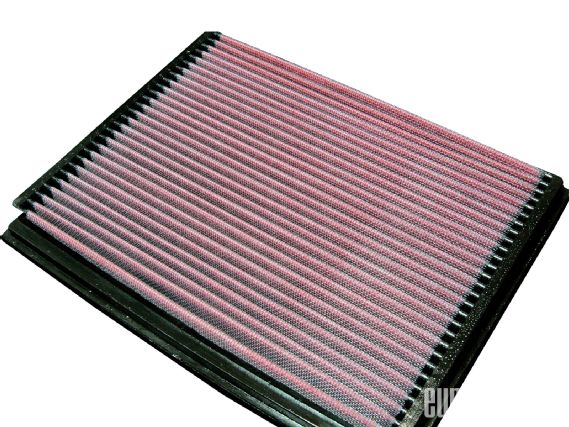 |
2008 Audi RS4 B7 - Proven
|
2008 Audi RS4 B7 - Proven
As with other software upgrades for drive-by-wire cars, the increased throttle response is obvious-actually, a little too responsive for me. Car owner Chris Smith, however, loves it. Either way, Revo can fine tune it to the owner's liking.
The increased revs from 8100 to 8300 rpm are also quite noticeable, helping acceleration times in the lower gears.
Test 2
Performance
Peak power: 336 hp @ 7500 rpm
Peak torque: 276 lb-ft @ 3400 rpm
Max power gain: 10.2 hp @ 7500 rpm
Max torque gain: 7.0 lb-ft @ 7500 rpm
3000-8000 rpm acceleration: 8.07 sec.
Temperature: 79° F
Humidity: 16%
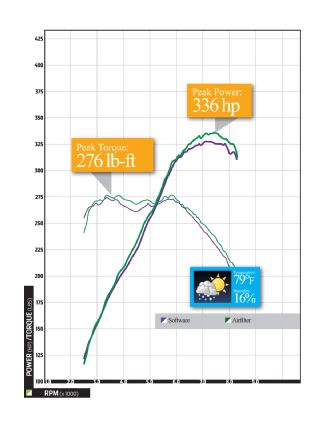 |
K&N Filter Drop-in air filter
|
K&N Filter Drop-in air filterGraph 2: Test 1-software vs. air filter
Parts: K&N drop-in filter
Installation time: 30 minutes
MSRP: $50
Pros
• Slight increase in power
• Slight increase in fuel economy
• Easy installation
Cons
• None
Test Notes
Decent bang for your buck, the K&N filter is not bad. It's also impressive that the car improved by an additional tenth of a second on the dyno pull despite the warmer weather. Unlike conical intake systems, there is no increase in sound volume by installing this filter-simply power gains and most likely a little better fuel economy.
With the K&N filter and Revo Stage 1 software installed we're already up to a peak gain of 17 hp at 6700 rpm and 16.1 lb-ft at 5000 rpm. Not bad for $750 and a little over an hour of installation time.
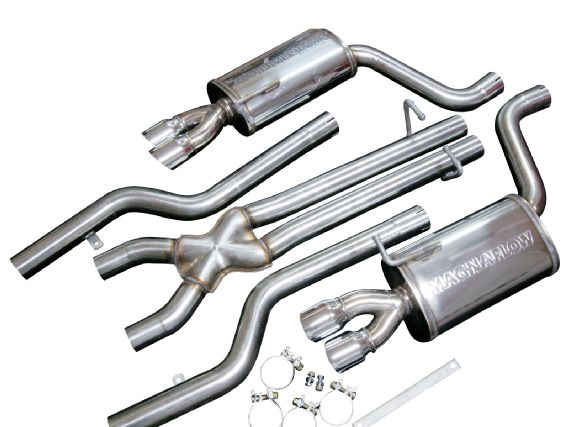 |
2008 Audi RS4 B7 - Proven
|
2008 Audi RS4 B7 - Proven
Test 3
Performance
Peak power: 335 hp @ 7500 rpm
Peak torque: 286 lb-ft @ 3600 rpm
Max power gain: 8.6 hp @ 3600 rpm
Max torque gain: 12.5 lb-ft @ 3600 rpm
3000-8000 rpm acceleration: 8.01 sec
Temperature: 80° F
Humidity: 19%
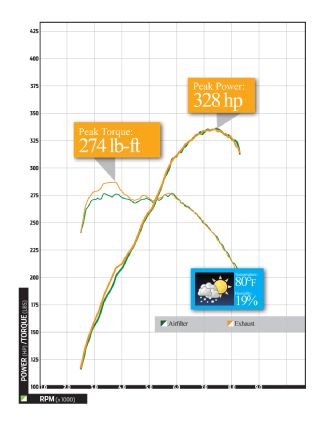 |
Magnaflow cat-back
Exhaust system
|
Magnaflow cat-back
Exhaust systemGraph 3: Test 2-Air filter vs. Exhaust System
Parts: Magnaflow cat-back
exhaust system
Installation time: 1.5 hours
MSRP: $1,228
Pros
• Good fit and finish
• Great sounds
• More than 20 pounds of weight savings
Cons
• Needs properly tuned ECU for performance gain
Test Notes
Magnaflow's stainless steel exhaust system is comprised of 2.5-inch tubing, and includes a "Tru-X" exhaust pipe, dual rear mufflers and quad 3-inch double-wall tips. On start-up the new V8 tone makes its presence known, sounding much deeper than you'd think a 4.2-liter V8 would. On the dyno, our first several runs netted us torque gains low in the range but a 10-hp loss up top.
After repeated runs with the engine properly warmed up, our best run netted 326 total whp. It didn't make sense until we noticed the curve hit south right after 4000 rpm, then realizing the difference in the air-to-fuel ratios. Although the Revo software was there, it doesn't affect the factory ECU's adaptive parameters, which apparently compensated for the exhaust's initial extra flow with what was apparently too rich a fuel mixture. In fact, it nearly dropped a full point, from 13:1 to 12:1.
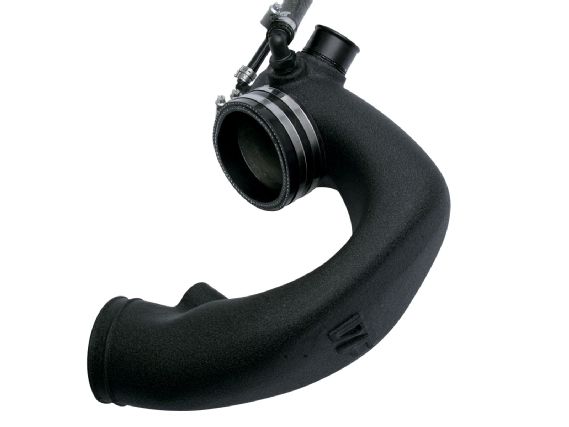 |
2008 Audi RS4 B7 - Proven
|
2008 Audi RS4 B7 - Proven
With Revo's George Osmun still by our side, he gave the software one click to lean out the fuel mixture across the board one notch, and the power immediately returned. We still didn't net a single horse from 4000 rpm on from the exhaust system-even after the software adjustment-but the car netted a respectable 8.6 hp and 12.5 lb-ft at 3600 rpm. While this won't help in a drag race, it definitely peps up daily commutes, highway passing, and powering out of slow speed turns.
Test 4
Performance
Peak power: 338 hp @ 7200 rpm
Peak torque: 296 lb-ft @ 3700 rpm
Max power gain: 9.4 hp @ 4700 rpm
Max torque gain: 10.7 lb-ft @ 4000 rpm
3000-8000 rpm acceleration: 7.80 sec
Temperature: 76° F
Humidity: 25%
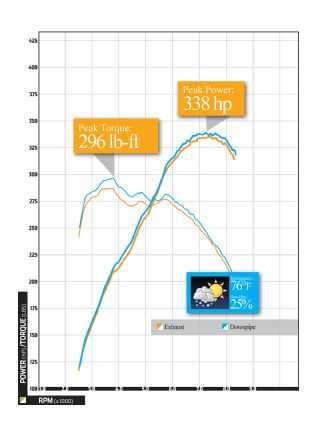 |
Stratmosphere/Milltek Downpipes
|
Stratmosphere/Milltek DownpipesGraph 4: Test 3-Exhaust vs. Downpipes
Parts: Stratmosphere/Milltek downpipes
Installation time: 1.5 hours
MSRP: $1,228
Pros
• Power gains throughout rev band
• Even throatier exhaust sound
• Great fit and finish
• 12-pound weight savings over stock
Cons
• Thanks to the cats and currency exchange rate, it's expensive
Test Notes
In most vehicles, the usual bottleneck in the exhaust are the catalytic converters. Sold through Stratmosphere, Milltek's downpipes free up this restriction with a pair of high-flow HJS cats, which on MKC's dyno showed a healthy gain throughout the rev band with no losses, peaking a 9.4 hp and 10.7 lb-ft gain in the midrange. Keep in mind this is with no additional software tweaks.
The sound is the best part. Whereas we got excited hearing the Magnaflow cat-back the first time, now with the two combined this RS4 truly sounds like it's got a highly tuned V8. If you can get by the price tag, Milltek downpipes are a very nice upgrade.
Test 5
Performance
Peak power: 342 @ 7500 rpm
Peak torque: 296 lb-ft @ 3700 rpm
Max power gain: 7.7 hp @ 8200 rpm
Max torque gain: 4.9 lb-ft @ 8200 rpm
3000-8000 rpm acceleration: 7.74 sec.
Temperature: 82°F
Humidity: 17%
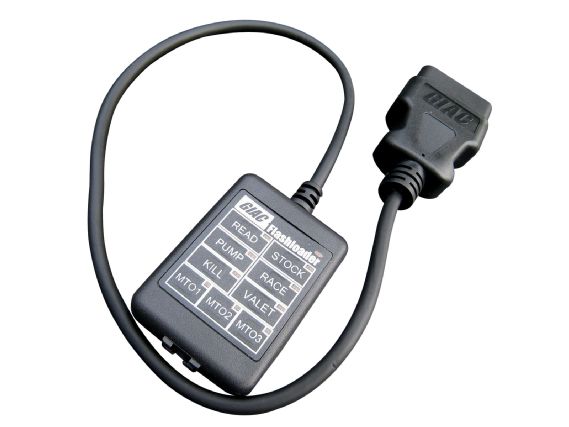 |
Optional Revo flashloader lets you load up different programs, including valet mode.
|
Optional Revo flashloader lets you load up different programs, including valet mode.
Parts: Revo Stage 2 software
Installation time: 15 minutes
MSRP: $699
Pros
• Rev limit increased to 8500 rpm
Cons
• None
Test Notes
To make the most of the upgrades, Revo developed its Stage 2 software specifically for cars running downpipes. With this software installed, the V8's power output increased primarily in the top end, cracking the 340-whp mark and netting an additional 7.7 hp and 5.5 lb-ft at 8200 rpm over the Stage 1 software.
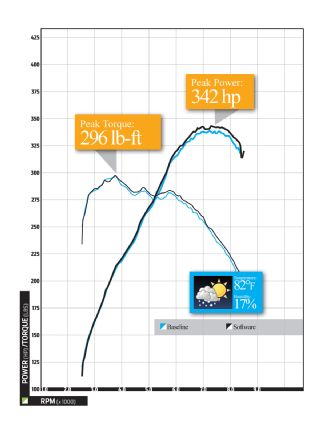 |
Revo Technik
Stage 2 software upgrade
|
Revo Technik
Stage 2 software upgradeGraph 5: Test 4-Downpipe vs. Software Stage 2
Keep in mind, had the Stage 2 software been compared to stock, the gain would be much larger. The rev limit has also been raised, hitting now at around 8500 rpm.
Conclusion
With an air filter, a header-back exhaust system and matching software, output not only rose from 321 whp to 342 whp, but there were sizeable gains from 3000 rpm through redline, making it a much better performer all around.
With all four upgrades combined, the low end improved to a peak 33.2 lb-ft of torque at 3700 rpm, and the top end to 28.2 whp at 8000 rpm, with no losses anywhere. Despite warm test weather, the measured 3000-8000rpm dyno pulls improved by 0.64 seconds and the car is significantly more responsive.
The new rumble out of the tail pipes makes the factory Sport-enabled exhaust note sound meek by comparison, and the fact that the exhaust upgrades saved 50-plus pounds definitely won't hurt performance.
Let's not forget the reduced rolling mass and improved grip. An 8 percent improvement in braking distances from 100 mph equates to a couple of car lengths.
It's not always easy improving on perfection. In fact, it's easy to make things much worse. But by choosing quality performance upgrades that actually work, it can be done. We did it here, and the owner once again is as excited as the day he drove the car off the showroom floor.

